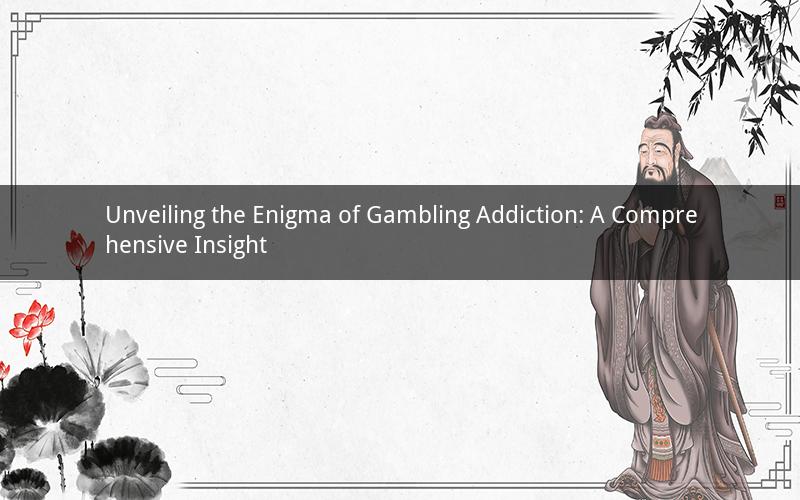
Introduction:
Gambling has long been a source of entertainment and a way to pass time for many people. However, it is essential to understand that gambling can become an addiction, leading to severe consequences in both personal and professional lives. This article delves into the depths of gambling addiction, exploring its causes, symptoms, and the impact it has on individuals and society. By shedding light on this pressing issue, we aim to raise awareness and encourage responsible gambling practices.
Section 1: Understanding Gambling Addiction
1.1 Definition of Gambling Addiction:
Gambling addiction, also known as compulsive gambling or problem gambling, is characterized by an uncontrollable urge to gamble, despite negative consequences. It is a mental health disorder that can affect people of all ages, genders, and backgrounds.
1.2 Causes of Gambling Addiction:
a. Genetic Factors: Studies suggest that genetics play a role in the development of gambling addiction, as certain individuals may inherit a predisposition to addictive behaviors.
b. Environmental Factors: Access to gambling opportunities, exposure to gambling advertisements, and social influence can contribute to the development of gambling addiction.
c. Psychological Factors: Individuals with certain personality traits, such as impulsivity, low self-esteem, and a need for excitement, may be more susceptible to gambling addiction.
Section 2: Symptoms and Signs of Gambling Addiction
2.1 Behavioral Symptoms:
a. Spending excessive amounts of time and money on gambling activities.
b. Making promises to stop gambling but failing to do so.
c. Borrowing money or selling possessions to fund gambling habits.
d. Feeling restless or irritable when unable to gamble.
2.2 Emotional Symptoms:
a. Feelings of guilt, shame, or regret after gambling.
b. Increased anxiety or depression due to gambling-related stress.
c. Developing a need for more money or larger bets to satisfy the thrill of gambling.
2.3 Social and Professional Symptoms:
a. Neglecting personal responsibilities, such as work, family, and friendships.
b. Straining relationships due to financial or emotional issues resulting from gambling.
c. Experiencing legal problems, such as theft or fraud, to fund gambling activities.
Section 3: Impact of Gambling Addiction
3.1 Personal Impact:
a. Financial Ruin: Individuals with gambling addiction often face severe financial consequences, including bankruptcy and loss of property.
b. Emotional and Psychological Damage: The emotional toll of gambling addiction can lead to depression, anxiety, and other mental health disorders.
c. Physical Health Complications: Chronic stress and anxiety associated with gambling addiction can lead to physical health issues, such as heart disease, stroke, and addiction-related diseases.
3.2 Social Impact:
a. Family Strain: Gambling addiction can strain relationships with loved ones, leading to emotional and financial hardship.
b. Societal Costs: The societal costs of gambling addiction include increased healthcare expenses, loss of productivity, and increased crime rates.
Section 4: Prevention and Treatment of Gambling Addiction
4.1 Prevention:
a. Responsible Gambling Education: Educating individuals about the risks and consequences of gambling can help prevent addiction.
b. Limiting Access to Gambling: Implementing measures to restrict access to gambling venues and online platforms can reduce the risk of addiction.
c. Encouraging Support Systems: Encouraging individuals to seek support from family, friends, and support groups can help prevent gambling addiction.
4.2 Treatment:
a. Cognitive-Behavioral Therapy (CBT): CBT helps individuals recognize and change the negative thoughts and behaviors associated with gambling addiction.
b. Support Groups: Support groups, such as Gamblers Anonymous, provide a platform for individuals to share their experiences and receive guidance from others who have overcome addiction.
c. Medication: In some cases, medication may be prescribed to help manage the symptoms of gambling addiction, such as depression or anxiety.
Conclusion:
Gambling addiction is a complex issue that affects individuals and society in various ways. By understanding the causes, symptoms, and consequences of gambling addiction, we can work towards prevention and treatment. It is crucial to promote responsible gambling practices and provide support for individuals struggling with gambling addiction to lead healthier and more fulfilling lives.
Questions and Answers:
1. Q: Can genetics play a role in the development of gambling addiction?
A: Yes, genetics may contribute to the predisposition of certain individuals towards addictive behaviors, including gambling addiction.
2. Q: What are the primary symptoms of gambling addiction?
A: The primary symptoms of gambling addiction include excessive time and money spent on gambling, making promises to stop gambling but failing to do so, and experiencing negative consequences as a result of gambling.
3. Q: How does gambling addiction impact an individual's financial well-being?
A: Gambling addiction can lead to severe financial consequences, including bankruptcy, loss of property, and increased debt.
4. Q: What treatment options are available for gambling addiction?
A: Treatment options for gambling addiction include cognitive-behavioral therapy, support groups, and medication to manage associated symptoms such as depression or anxiety.
5. Q: How can individuals prevent gambling addiction?
A: Individuals can prevent gambling addiction by educating themselves about the risks and consequences of gambling, limiting access to gambling venues and online platforms, and seeking support from family, friends, and support groups.